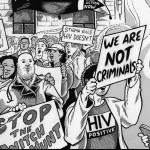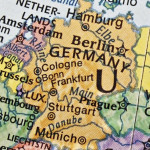This summer, in Amsterdam, I smiled as I watched a woman in a yellow sari successfully cajole a stiff-kneed activist in beige shorts to dance during an afternoon party on a main stage of the 22nd International AIDS Conference (AIDS 2018).
These global gatherings bring together people who might never get a chance to be in one place at the same time. For example, a public health official from Eastern Europe, a sex worker from Latin America and a needle exchange advocate from South Asia could walk down a conference corridor after a break out session to discuss and create a new global initiative to address hepatitis C and HIV co-infection. Or, a group of scientists in the exhibition hall could take a selfie with Timothy Brown, the only person to have been cured of HIV.
Plans are now underway for the 23rd International AIDS Conference (AIDS 2020), which is slated to take place in Oakland and San Francisco. Over the summer and now into the fall, a group of HIV activists, including myself, have tried to convince organizers that AIDS 2020 should be held elsewhere. While we don’t have anything against the two U.S. host cities, we do have problems with what it means to host an international AIDS-related gathering in the United States at a time when regardless of what side of the border you are on, the country has grown increasingly inhospitable to people affected by the virus.
At the moment, the current administration’s travel policies — which ban people from Iran, Libya, North Korea, Somalia, Syria, Venezuela and Yemen from entering the country — will likely keep key communities from within the HIV response from being able to attend. This exasperates already existing U.S. border policies that restrict people affected by HIV from entering, likely keeping more people away.
While moving the conference would be costly, and a logistical hassle, we believe such a move would be prudent considering the challenges facing many potential attendees.
While no one currently in the International AIDS Society (IAS) — the nonprofit membership organization responsible for the conference — has made an official statement about moving AIDS 2020, incoming executive director Kevin Osborne told me in an interview in Amsterdam that “for the moment we are really looking to stay the course.” In other words, the conference is staying put — for now.
Osborne said he understood the concerns about travel, but was confident that having AIDS 2020 in the United States would provide an opportunity to shine a spotlight on the work still remaining to end the ongoing epidemic. In July, the World Health Organization reported that nearly 40 million people around the world are living with AIDS. For that reason, it’s extremely important for anyone, regardless of country of origin, with expertise and experience, to be allowed to attend and contribute to AIDS 2020.
With that in mind, in Amsterdam, myself and other New York City activists at AIDS 2018 joined PowerShift, a cadre of global voices who are calling on IAS to reconsider its plans for AIDS 2020. PowerShift’s first action was a guerilla press conference.
By 8 a.m. of the first full day of AIDS 2018, 15 of us — a coalition of people living with HIV, sex workers, AIDS service organization employees, parents, activists and artists, some still jet lagged, and many fueled on coffee and adrenaline — gathered at the entrance of the media center, where the global press were working, and near an escalator that was a major thoroughfare during the conference.
Once we were all in place, two people carried a hidden 18-foot banner up the escalator. Another two people began handing out press releases. I was talking to a reporter when I heard the crackle of a megaphone. I turned around to see the banner unfurled: “IAS: NO AIDS 2020 IN TRUMP’S USA.”
We began to chant, "IAS: OPEN YOUR EYES: U.S. CONFERENCE IS UNWISE,” and soon passersby joined in.
During the next 30 minutes, various leaders from within the AIDS community spoke about how life under Trump had become worse. There have been the cuts to Obamacare; the increased violence towards Black people, trans women, and others within the LGBT community; news that AIDS money had been used to pay for the separation of families at the U.S. border with Mexico; and the fact that people living with HIV would no longer be welcome to serve in the U.S. military.
At AIDS 2018, Dázon Dixon Diallo, founder and president of SisterLove, Inc., said that now was not the time to hold a conference in the United States.
“I am too embarrassed to have anyone come to my house when it is dirty.”
***
In 1985, the 1st International AIDS Conference, organized by the Centers for Disease Control and Prevention (CDC), the World Health Organization (WHO) and Emory University attracted nearly 2,000 researchers, scientists and public health officials to the CDC’s home in Atlanta, Georgia. Over the next few years the conference grew to include civil society as well as a vocal contingent of people living with HIV, who in Montreal at the 1989 conference stormed the opening session demanding that their voices be included in decisions concerning their lives.
Amid these early years of knowledge sharing and tension, complications also arose. Two years after the first conference, then-president Ronald Reagan put into effect a ban that kept people with HIV from entering the United States, thus eventually putting a wrench in the country’s ability to host global HIV-related meetings.
For the 1990 conference in San Francisco, the U.S. government issued waivers so that HIV-positive delegates could attend. That same year, IAS publicly condemned the ban and said they would no longer sponsor any country for future conferences that barred people living with HIV. The 1992 conference, originally scheduled to take place in Boston, was moved to Amsterdam.
As a young AIDS activist from Canada in the early aughts, I remember friends with HIV preparing to travel to the United States for vacation or work talking about hiding their AIDS meds deep in their luggage. Others vowed to never travel to a country that was so hateful toward them.
In 1993, Bill Clinton signed a bill that turned the ban into law. Twelve editions of the conference later, it finally returned to the United States.
President Obama lifted the HIV ban in 2009, opening the doors for the 19th International AIDS Conference (AIDS 2012) to be held in Washington, DC, as well as AIDS 2020 in San Francisco and Oakland.
In my conversation with Osborne from IAS, he reaffirmed the organization’s commitment to not supporting countries that ban people living with HIV from entering. He said the Trump administration reinstating the HIV ban would be “a red line” that IAS would not cross.
Earlier this year, IAS itself released a statement about Trump’s current travel restrictions: “This ban will mean that HIV scientists, frontline health workers and advocates from affected countries will not be able to obtain visas to attend professional gatherings in the United States.”
Why, if IAS understands the perils faced by those wanting to attend AIDS 2020 if it is hosted in the United States, are they unwilling to change their plans? How red does the line have to be?
***
While maybe not traditionally regarded as HIV-affected countries, all the nations Trump has banned have sizable epidemics and enough instability to suggest that health in general, including HIV rates, should not be neglected. While approximately 0.03 percent of people in the United States are living with HIV, Venezuela is at 0.04 percent, Somalia is at 0.04 percent, and Iran is at 0.01 percent. Recent HIV stats for the other countries banned are difficult to obtain, which itself is a bad sign.
A country’s failure to report information suggests dilapidated health-related infrastructure and communication mechanisms, a government’s possible desire to keep HIV-related health information secret from the global community, and signs of a possible silent health epidemic brewing, HIV-related or not. For years it was difficult to confirm the HIV rates within the countries that comprised the former Soviet Union, which are now dealing with sizable epidemics. In the Ukraine and Russia, around 1 percent of the adult population is living with HIV.
“I don’t think you can shut out countries like Iran from the conversation if you’re serious about ending the epidemic,” said Housing Works founder and CEO Charles King. “Similarly, you’ve got Somalia and South Sudan where violence and war have actually heightened the levels of opportunity for the epidemic.”
Of the banned countries, King is most worried about Venezuela. During an economic crisis that has resulted in food and medicine shortages, Venezuelan president Nicolás Maduro has not accepted offers of humanitarian aid. The Daily Telegraph reported that this year 100 percent of the 85,000 HIV-positive patients enrolled in the government’s free medicine program stopped receiving their life-saving antiretroviral treatment. And yet, as King said, “if you hold Venezuelan citizenship you are not going to be able to enter the United States” to attend AIDS 2020, where there would be community and life-saving medication.
Aside from being from a country included in Trump’s travel ban, existing border policy says that someone may be denied entry into the United States for having previously been convicted of a crime involving “moral turpitude,” such as those connected to sex work, or related to being caught with a “controlled substance,” meaning drugs.
At an AIDS 2018 panel entitled, “The Trump effect: How the U.S. is jeopardizing the global AIDS response,” Dorothy Ogutu, executive director of the African Sex Workers Alliance, said that she and her organization would not attend a conference in the United States. She also shared that sex workers from around the world were already discussing a counter conference. There already is precedent for this alternative. Global sex workers, in protest of U.S. border policies, hosted their own AIDS conference in Calcutta at the same time as AIDS 2012.
Ogutu’s comments were met with applause, a sign that many conference attendees, including other presenters who had spoken up, wanted IAS to reconsider its AIDS 2020 plans.
A few months after AIDS 2018, the St. James Infirmary — the only peer-based occupational health and safety clinic for sex workers in the United States, which is based in the Bay Area — echoed Ogutu.
In its statement opposing the IAS decision, the St. James Infirmary raised the question if anyone living with HIV will be allowed to enter the United States for AIDS 2020 given Trump’s state of mind, and wondered about the quality of the experience for those who do get let in, considering IAS plans to break up the conference by location, with the main conference happening in San Francisco, and the Global Village, where the bulk of activists and civil society gather, in Oakland.
In its statement, the folks at the St. James Infirmary suggest that “crossing the Bay to go to both the main conference in SF and the Global Village in Oakland is going to be both expensive and impractical; very few people will do it, widening the already massive divide between the researchers and the researched.”
Naina Khanna, executive director of Positive Women’s Network–USA, has similar concerns when it comes to who may be let in, wondering what procedures IAS is going to put in place to ensure people’s safety if they do attend the Bay Area conference. She points out that mass detention has already occurred at the borders. “No act of goodwill from IAS, its network, or even individual members of the U.S. Congress can ensure visa approvals,” she said, “nor can they prevent detention, interrogation, intimidation or exposure to violence and harm once in the United States.”
Since the end of the summer PowerShift has continued its work. The group has been hosting webinars and was present and vocal at the 2018 United States Conference on AIDS promoting more conversation to ensure that AIDS 2020 will be accessible for all. A Facebook poll done in July by TheBody.com, a leading AIDS resource, shows that 71 percent of respondents think AIDS 2020 should be moved.
In the end, Osborne from IAS hopes that given the uncertainty people living with and affected by HIV face under Trump, hosting the conference in the United States could have a positive impact. He also noted that nothing is set in stone. “IAS is absolutely flexible in some ways,” he said.
Theodore (ted) Kerr is a Canadian-born, Brooklyn-based artist, writer and organizer whose work focuses on HIV/AIDS. He is a founding member of What Would an HIV Doula Do?. He teaches at The New School, and his writing has appeared in POZ, The Village Voice, The Advocate, Hyperallergic, The New Inquiry and other publications.







Comments
Comments